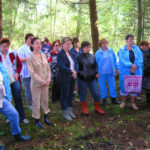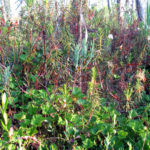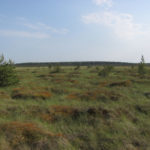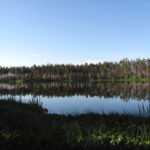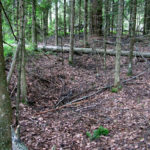Grinchenko O.S. Ecological and Literary Trails of the Northern Moscow Region // Ecosystems: ecology and dynamics. No 4. 2023. P. 177-198. | Abstract | PDF | Reference
- “Ecological Education of students in Specially Protected Natural Areas of the Moscow Region”, a workshop for teachers of Taldomsky District in the House-museum of S.A. Klychkov, August 27, 2006 (photo by O.S. Grinchenko)
- Tour to the ecological and literary trail, August 27, 2006 (photo by O.S.Grinchenko)
- Cranberry and marsh calla on a floating sphagnum bog near Batkovsky Lake, 12/07/2015 (photo by O.S.Grinchenko)
- Crowberry and flowering cranberry at the Batkovsky Bog, 12/06/2014 (photo by O.S.Grinchenko)
- Marsh Labrador tea and cloudberry at the Batkovsky Bog, 8/06/2014 (photo by O.S.Grinchenko)
- Open part of the Batkovsky Bog, 7/06/2015 (photo by O.S.Grinchenko)
- Maloye Tugolyansky Lake, 12/06/2014 (photo by O.S.Grinchenko)
- Bolshoe Tugolyansky Lake, 20/06/2013 (photo by V.V.Kontorshchikov)
- Coal pits o near Tugolyansky Lakes, 15/06/2015 (photo by V.V.Kontorshchikov)
- A flock of Eurasian curlews, 14/04/2018 (photo by S.Rubin)
- Greater white-fronted geese and bean geese on the flooded fields of the Vytravka River, 14/04/2018 (photo by S.Rubin)
- First tour to Knyazhiy Isle, 21/12/2019 (photo by O.S.Grinchenko)
In the north of the Moscow region there is a state natural reserve “Crane Homeland”, named after the M.M. Prishvin’s story of the same name. In combines interesting natural and barely disturbed landscapes, where the habitats of common cranes, bogs and forests, the floodplain of the Dubna River and Lake Zabolotskoye are preserved. Ecological and literary tours take place there, offering trips along the trails of M.M. Prishvin and S.A. Klychkov, teaching about ‘bagovnik’ (Marsh Labrador tea) and ‘gonobobel’ (bog blueberry), showing wild cranes in the distance and offering immersion in the era of Sergius of Radonezh.
In 2023, ecological-literary trails in Russia are only at the initial stage of their development. To date, we have created 3 trails in the Northern Moscow Region: 1) “At Chertukhinsky Balakir” (that goes through the places of S.A. Klychkov), 2) Prishvin’s trail at Tugolyan Lakes, 3) Prishvin’s places along the Vytravka River and at the Shavykina Pustyn (wasteland). The tours along them highlight both the rich flora and fauna of the region, and the stages of literary work of Russian writers and religious figures who visited these places. Additionally, the prepared materials tell about modern trends in climate change and related changes in the hydrological regime of bogs and small river basins of the Upper Volga River.
Keywords: the reserve “Crane Homeland”, ecological and literary tourist trail, ecological and literary excursions, Lake Zabolotsk, Tugolyansky lakes, Vytravka River, Prishvinsky places, Knyazhiy Island, Shavykina Pustyn, flora and fauna of the Northern Moscow Region.
Funding. This article and analysis of all materials were made for the project No. FMWZ-2022-0002 for the Water Problems Institute of the Russian Academy of Sciences “Studying Geo-Ecological Processes in Hydrological Land Systems, Formation of Surface Water and Groundwater Quality, Problems of Water Resources Management and Water Use under Climate Change and Anthropogenic Impacts”.
DOI: 10.24412/2542-2006-2023-4-177-198
EDN: GHIRNG




